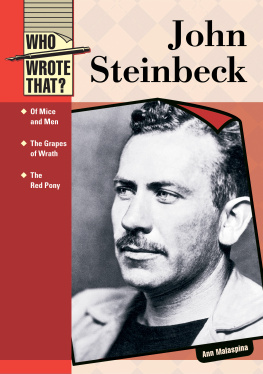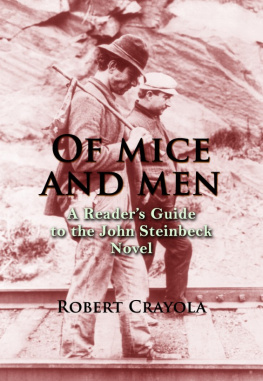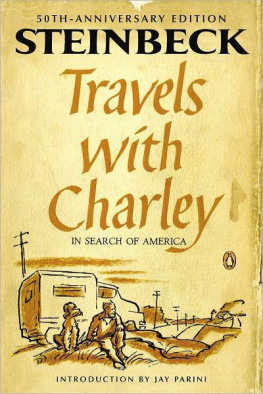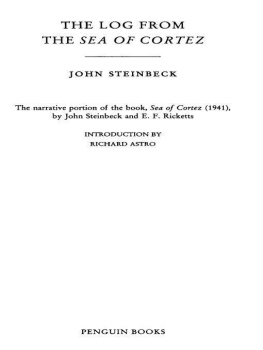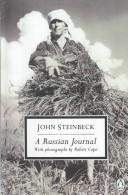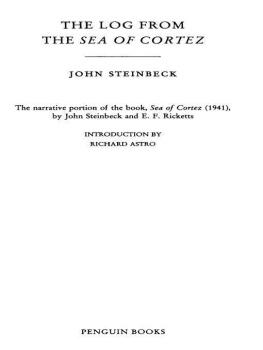Table of Contents
PENGUIN BOOKS
OF MICE AND MEN
Born in Salinas, California, in 1902, JOHN STEINBECK grew up in a fertile agricultural valley about twenty-five miles from the Pacific Coastand both valley and coast would serve as settings for some of his best fiction. In 1919 he went to Stanford University, where he intermittently enrolled in literature and writing courses until he left in 1925 without taking a degree. During the next five years he supported himself as a laborer and journalist in New York City and then as a caretaker for a Lake Ta-hoe estate, all the time working on his first novel, Cup of Gold (1929). After marriage and a move to Pacific Grove, he published two California fictions, The Pastures of Heaven (1932) and To a God Unknown (1933), and worked on short stories later collected in The Long Valley (1938). Popular success and financial security came only with Tortilla Flat (1935), stories about Montereys paisanos. A ceaseless experimenter throughout his career, Steinbeck changed courses regularly. Three powerful novels of the late 1930s focused on the California laboring class: In Dubious Battle (1936), Of Mice and Men (1937), and the book considered by many his finest, The Grapes of Wrath (1939). Early in the 1940s, Steinbeck became a filmmaker with The Forgotten Village (1941) and a serious student of marine biology with Sea of Cortez. He devoted his services to the war, writing Bombs Away (1942) and the controversial play-novelette The Moon Is Down (1942). Cannery Row (1945), The Wayward Bus (1947), The Pearl (1947), A Russian Journal (1948), another experimental drama, Burning Bright (1950), and The Log from the Sea of Cortez (1951) preceded publication of the monumental East of Eden (1952), an ambitious saga of the Salinas Valley and his own familys history. The last decades of his life were spent in New York City and Sag Harbor with his third wife, with whom he traveled widely. Later books include Sweet Thursday (1954), The Short Reign of Pippin IV: A Fabrication (1957), Once There Was a War (1958), The Winter of Our Discontent (1961), Travels with Charley in Search of America (1962), America and Americans (1966), and the posthumously published Journal of a Novel: The East of Eden Letters (1969), Viva Zapata! (1975), The Acts of King Arthur and His Noble Knights (1976), and Working Days: The Journals of The Grapes of Wrath (1989). He died in 1968, having won a Nobel Prize in 1962.
BY JOHN STEINBECK
FICTION
Cup of Gold
The Pastures of Heaven
To a God Unknown
Tortilla Flat
In Dubious Battle
Saint Katy the Virgin
Of Mice and Men
The Red Pony
The Long Valley
The Grapes of Wrath
The Moon is Down
Cannery Row
The Wayward Bus
The Pearl
Burning Bright
East of Eden
Sweet Thursday
The Winter of Our Discontent
The Short Reign of Pippin IV
NONFICTION
Sea of Cortez: A Leisurely Journal of Travel and Research
(in collaboration with Edward F. Ricketts)
Bombs Away: The Story of a Bomber Team
A Russian Journal (with pictures by Robert Capa)
The Log from the Sea of Cortez
Once There Was a War
Travels with Charley in Search of America
America and Americans
Journal of a Novel: The East of Eden Letters
PLAYS
Of Mice and Men
The Moon Is Down
COLLECTIONS
The Portable Steinbeck
The Short Novels of John Steinbeck
Steinbeck: A Life in Letters
OTHER WORKS
The Forgotten Village (documentary)
Viva Zapata! (screenplay)
CRITICAL LIBRARY EDITION
The Grapes of Wrath (edited by Peter Lisca)
OF MICE AND MEN
A FEW MILES south of Soledad, the Salinas River drops in close to the hillside bank and runs deep and green. The water is warm too, for it has slipped twinkling over the yellow sands in the sunlight before reaching the narrow pool. On one side of the river the golden foothill slopes curve up to the strong and rocky Gabilan mountains, but on the valley side the water is lined with treeswillows fresh and green with every spring, carrying in their lower leaf junctures the debris of the winters flooding; and sycamores with mottled, white, recumbent limbs and branches that arch over the pool. On the sandy bank under the trees the leaves lie deep and so crisp that a lizard makes a great skittering if he runs among them. Rabbits come out of the brush to sit on the sand in the evening, and the damp flats are covered with the night tracks of coons, and with the spread pads of dogs from the ranches, and with the split-wedge tracks of deer that come to drink in the dark.
There is a path through the willows and among the sycamores, a path beaten hard by boys coming down from the ranches to swim in the deep pool, and beaten hard by tramps who come wearily down from the highway in the evening to jungle-up near water. In front of the low horizontal limb of a giant sycamore there is an ash pile made by many fires; the limb is worn smooth by men who have sat on it.
Evening of a hot day started the little wind to moving among the leaves. The shade climbed up the hills toward the top. On the sand banks the rabbits sat as quietly as little gray, sculptured stones. And then from the direction of the state highway came the sound of footsteps on crisp sycamore leaves. The rabbits hurried noiselessly for cover. A stilted heron labored up into the air and pounded down river. For a moment the place was lifeless, and then two men emerged from the path and came into the opening by the green pool.
They had walked in single file down the path, and even in the open one stayed behind the other. Both were dressed in denim trousers and in denim coats with brass buttons. Both wore black, shapeless hats and both carried tight blanket rolls slung over their shoulders. The first man was small and quick, dark of face, with restless eyes and sharp, strong features. Every part of him was defined: small, strong hands, slender arms, a thin and bony nose. Behind him walked his opposite, a huge man, shapeless of face, with large, pale eyes, with wide, sloping shoulders; and he walked heavily, dragging his feet a little, the way a bear drags his paws. His arms did not swing at his sides, but hung loosely.
The first man stopped short in the clearing, and the follower nearly ran over him. He took off his hat and wiped the sweat-band with his forefinger and snapped the moisture off. His huge companion dropped his blankets and flung himself down and drank from the surface of the green pool; drank with long gulps, snorting into the water like a horse. The small man stepped nervously beside him.
Lennie! he said sharply. Lennie, for God sakes dont drink so much. Lennie continued to snort into the pool. The small man leaned over and shook him by the shoulder. Lennie. You gonna be sick like you was last night.
Lennie dipped his whole head under, hat and all, and then he sat up on the bank and his hat dripped down on his blue coat and ran down his back. Thas good, he said. You drink some, George. You take a good big drink. He smiled happily.
George unslung his bindle and dropped it gently on the bank. I aint sure its good water, he said. Looks kinda scummy.
Lennie dabbled his big paw in the water and wiggled his fingers so the water arose in little splashes; rings widened across the pool to the other side and came back again. Lennie watched them go. Look, George. Look what I done.









